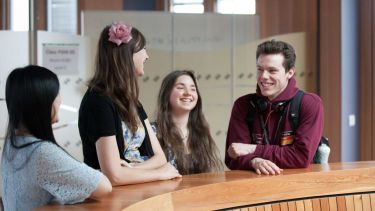- The University of Sheffield is celebrating its friendship with the Czech Republic as the country takes over the EU presidency
- Czech is the official language of the Czech Republic, but outside of the country there is a shortage of people who can speak the language fluently
- The University of Sheffield is one of only four UK universities to teach Czech and has the most students learning Czech of any UK university - Sheffield has taught Czech for nearly 50 years
- Around a dozen students graduate from Czech language degrees in the UK each year - giving those who can speak native-level English and fluent Czech a truly unique skill to offer employers both in the UK and throughout Europe
- Training Sheffield graduates to be specialists of the languages and culture of highly industrialised and competitive economies like the Czech Republic is key to helping boost their employability and revive our economy
As the Czech Republic takes over the EU presidency this month (July 2022), the University of Sheffield is celebrating its friendship with the country, being the biggest provider of Czech language degrees in the UK.
The EU presidency, which is given to a different EU member state every six months, plays a key role in defining the general political direction and priorities of the European Union. In its presidency, the Czech Republic is set to focus on priority areas, including the war in Ukraine, energy security, strengthening Europe’s defence capabilities and the economy.
Czech is the official language of the Czech Republic - spoken by more than 10 million people - but outside of the country there is a shortage of people who can speak the language fluently.
With many major international companies having a presence in the Central European nation, which borders Austria, Germany, Poland and Slovakia, such as Hyundai, Vodafone and the European energy giant Alpiq, there is an increasing demand for people who can speak Czech fluently. Those who can combine Czech with native-level English and other European languages are highly sought after in business and government, with one of the EU’s founding principles being multilingualism and being able to communicate with citizens in their own languages.
In the UK, approximately a dozen students graduate from a Czech language degree every year, meaning those who can speak Czech have a truly unique skill to offer employers, both in the UK and throughout Europe.
The University of Sheffield has taught Czech as a modern language for nearly 50 years, and is one of only four universities to teach Czech in the UK. Sheffield has the most students learning the Czech language of any UK university.
Most students studying Czech at Sheffield learn it alongside some of the most spoken languages in Europe, such as Dutch, French, German, Italian, Russian and Spanish. Aside from the languages, students also study each country’s history and culture, giving them an in-depth understanding of each nation - crucial for building and maintaining international relations in a post-Brexit Europe.
A NATO member, the Czech Republic is in a key strategic position in the heart of central Europe. It’s the headquarters for major international companies such as Škoda, whose cars are sold in more than 100 countries, and ČEZ, the largest utility company in the Central and Eastern European region. Teaching students to be fluent in Czech is providing Sheffield graduates with a unique skill to offer employers both in the UK and throughout Europe.
The University of Sheffield’s School of Languages and Cultures also has a strong background in Slavonic studies - the languages and cultures of Central and Eastern European countries. Insights and expertise drawn from this could be of particular use to the UK and EU as Europe responds to the war in Ukraine and the impact it is having in the surrounding region.
Professor Neil Bermel, Director of Czech Studies at the University of Sheffield, said: “Czech is a fascinating language that is spoken at the heart of Central Europe. For a language spoken by relatively few people on the global scale, it’s incredibly important and even more so now with the Czech Republic’s role in NATO and the European Union.
“The UK is widely acknowledged as having a languages deficit: we assume everyone speaks our language and we don't learn theirs. As a result, British companies are more hesitant to enter foreign markets because they don't understand them or have the staff who can help them learn to do so. This hits our ability to export and import goods, which is especially important post-Brexit, and it makes it harder for the UK to react agilely to international developments. Our graduates are specialists in the 'big' languages like German, Spanish and French, but also in the languages and cultures of the other highly industrialised and competitive economies of Europe, like the Czech Republic; they're key to helping revive our economy and place in the world."
Professor Bermel added: “The war in Ukraine is also placing increasing importance on the study of Slavonic languages and cultures, as its fallout is having an impact on the wider Eastern and Central European region. Understanding each country’s languages and cultures is going to be crucial as Europe responds. For example, our graduates understand instinctively why the reaction to Russia’s invasion has been so visceral and sharp across Central and Eastern Europe: they have lived in countries that were client states of the Soviet Union and suffered invasions of Warsaw Pact troops in living memory. They’ve also got the language skills to help with current arrivals from those countries. They’re a real resource to guide the UK through the current crisis.
“One of the strains that runs through our research here in Slavonic studies at Sheffield is the multilingual, multinational influences that pervade the Slavonic countries. Sometimes it’s a matter of mapping the interactions of foreign cultures in the Czech lands, like my colleague Luděk Knittl and I have done with the language of heritage sites, and sometimes it’s about emphasising the central role of Czech scholarship and science and the contribution of Czech data to a research field, the way we have done in our recent UKRI-funded grant on morphology.”
Whilst learning Czech, students at Sheffield have been able to take part in several projects that have made an impact both in the UK and the Czech Republic.
Students studying Czech at Sheffield translated the diary of a WWII Czech legionnaire for his English-speaking daughter, which helped her learn for the first time about her father’s service in Poland, the Soviet Union, Turkey, Israel and Africa.
Sheffield students have helped two Czech castles - Hrubý Rohozec and Grabštejn - translate tour guides, signs, brochures and websites into English to help attract more tourism.
Czech students at Sheffield have worked with a zoo in Brno - the Czech Republic’s second largest city - to create an app for English-speaking children, so they could learn more about the animals on display.
Students from the University translated subtitles for two Czech documentaries by Věra Chytilová, a pioneer of Czech cinema, enabling them to be broadcast at the British Film Institute and later at a film festival in Munich. The students also translated two Czech plays so they could be performed in the UK.
Graduates from Sheffield have gone on to develop successful careers, using their language skills, both in the UK and the Czech Republic.
Aaron Bohlman, a modern languages graduate from the University of Sheffield, said: “I studied Czech at Sheffield alongside French and Spanish, graduating in 2013. I got so much out of my degree in Czech, from staying in castles to month-long summer school placements. After graduating, I moved to Prague for several years and worked in a tech startup, before returning to the UK where I now work as a full-time Czech translator.
“I think that learning any language is invaluable since it opens up opportunities that wouldn't otherwise be available to monolingual people. Speaking a foreign language allows you to cultivate relationships with people, with the added respect of doing it in their language, not expecting them to speak English.
“As for Czech, learning any Slavonic language is a gateway to the others due to their similar grammar and vocabulary. So as a Czech speaker I can understand Slovak without much difficulty and am in a good position to learn Russian, Polish or another language from the region. There is also a particular joy in learning a language with relatively few speakers. I have had a range of rich experiences through my study of Czech, none of which I could have predicted beforehand.”
Jenny Taylor, who also studied Czech at the University of Sheffield, said: “I was the first Erasmus student from Sheffield to attend Charles University in Prague - one of the oldest universities in Europe. I was nervous at first but I ended up moving to Prague after graduation, lived there for eight years or so, and have been working as a freelance Czech translator since 2006. I've also spent the last academic year teaching a Czech undergraduate translation class at Sheffield, so things have gone full circle!
“If you're tempted to learn a language but not sure which one, why not stand out from the crowd and learn one that’s somewhat more niche? Travel enriches your life and knowledge of other languages enriches your soul. If you’ve considered it for a moment, just go for it! The Czech Republic is a thriving country in the EU and a wonderful place to live.”
Aside from Czech language degrees, Sheffield also teaches Czech to students from non-language degree courses, University staff and members of the public through its Languages For All initiative in its Modern Languages Teaching Centre.
People can study Czech from beginners through to advanced level - equivalent to Level C1 of the Common European Framework of Reference for Languages.
Academics from Czech Studies at Sheffield also play a key role in building relations within the city’s Czech and Slovak community by leading a Czech and Slovak Society. The society is open to anyone interested in Czech and Slovak language and culture, and arranges regular events, such as film screenings, talks and events for families throughout the year.
Contact:
For further information please contact:









